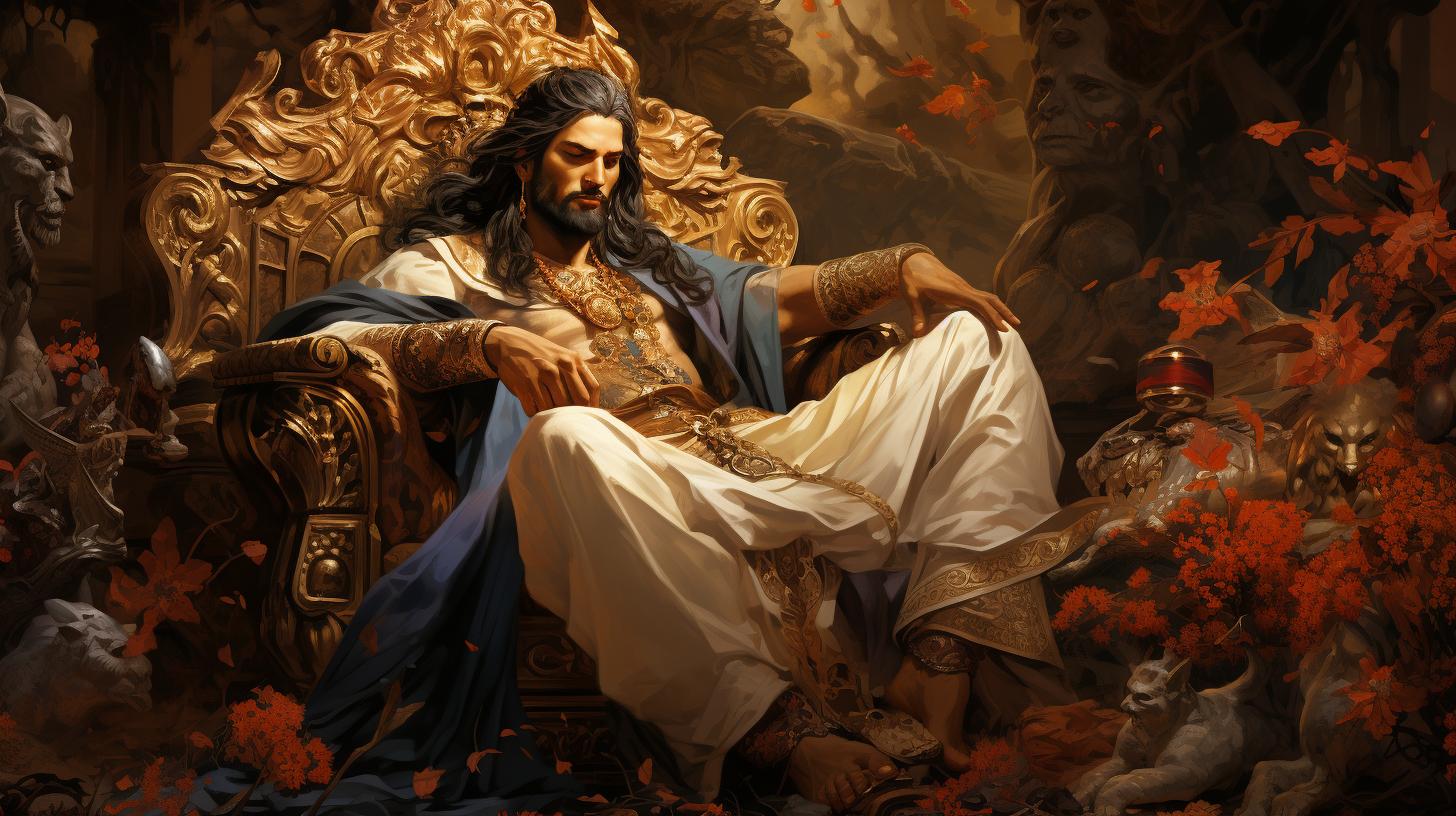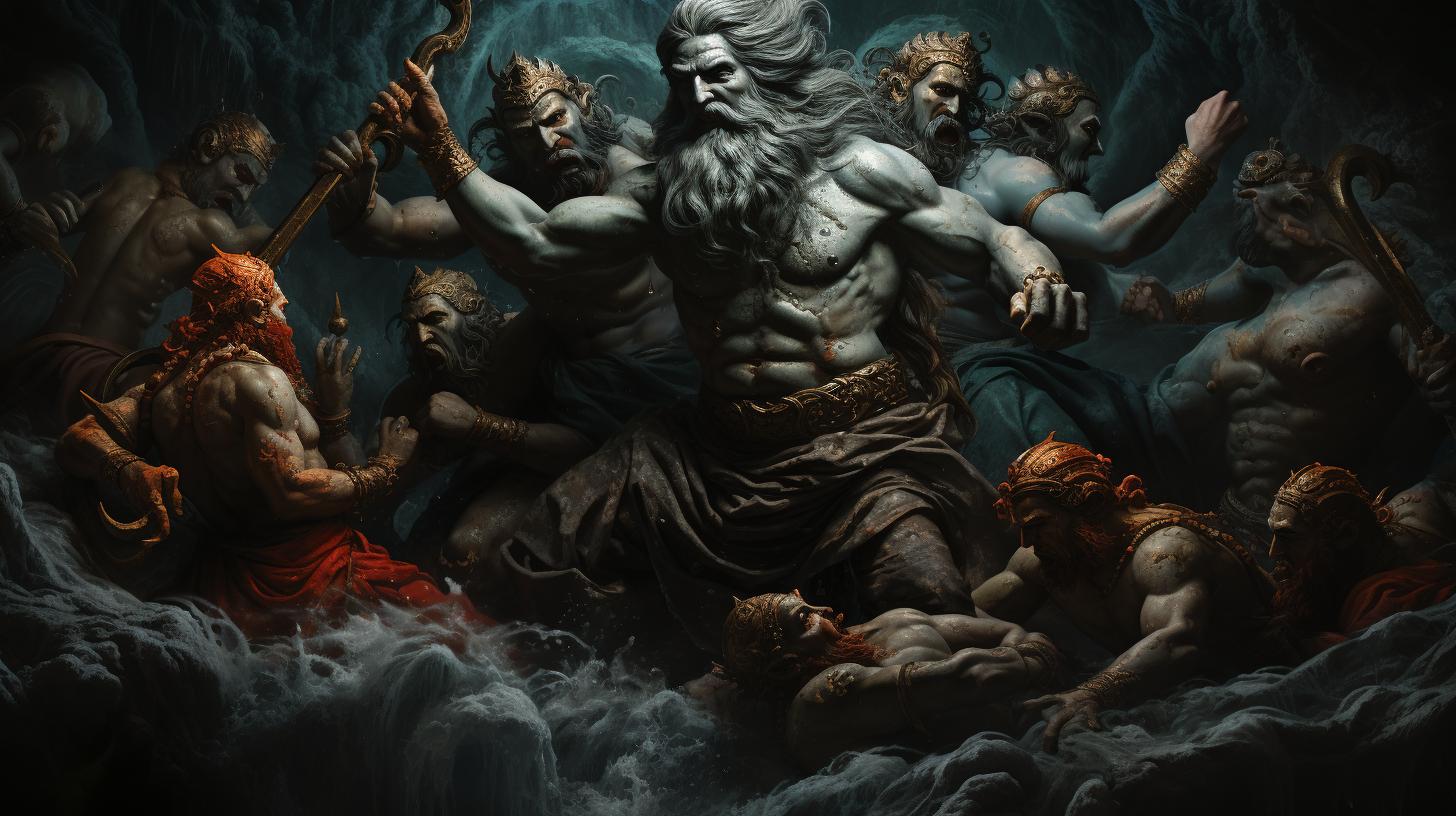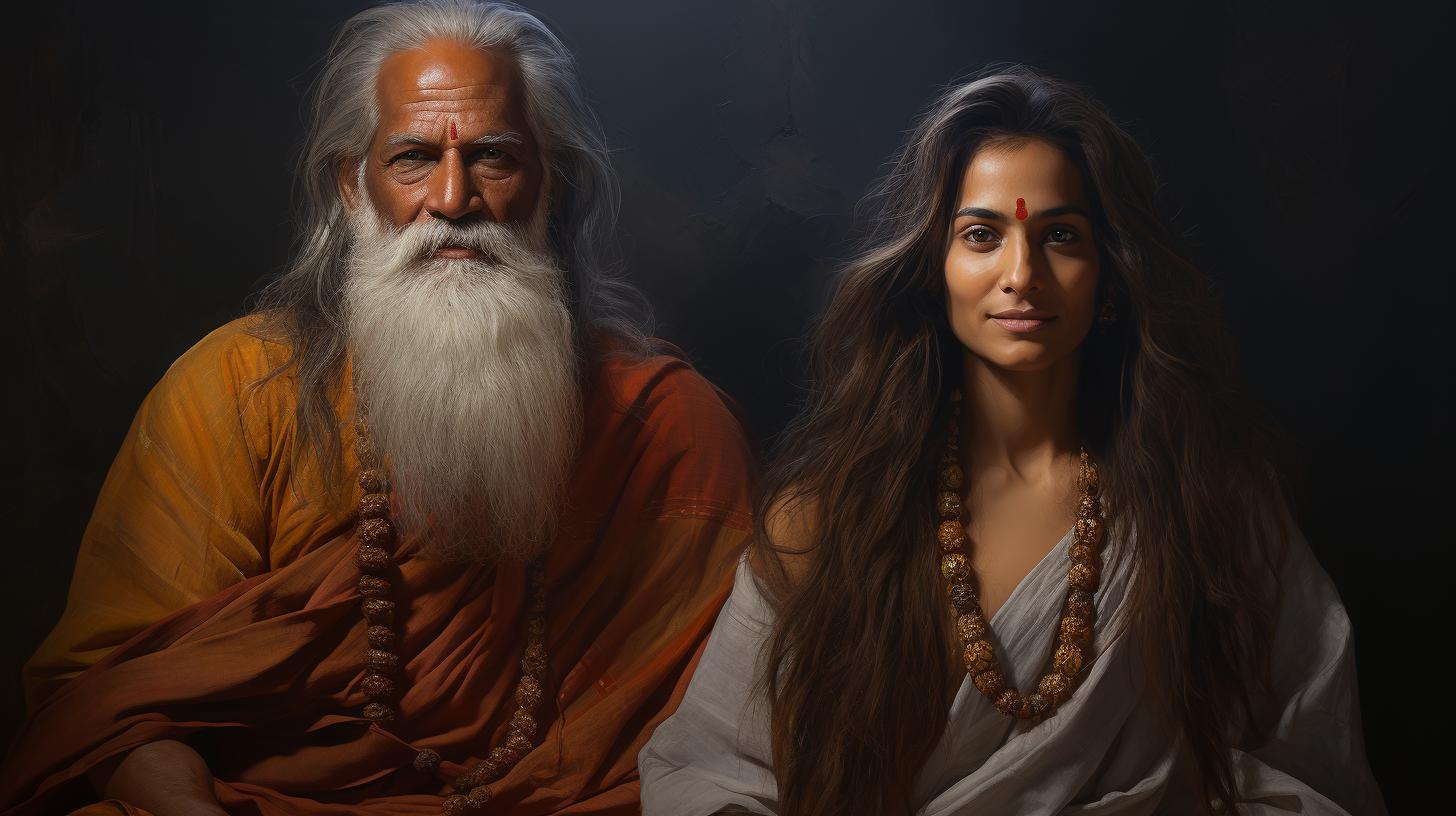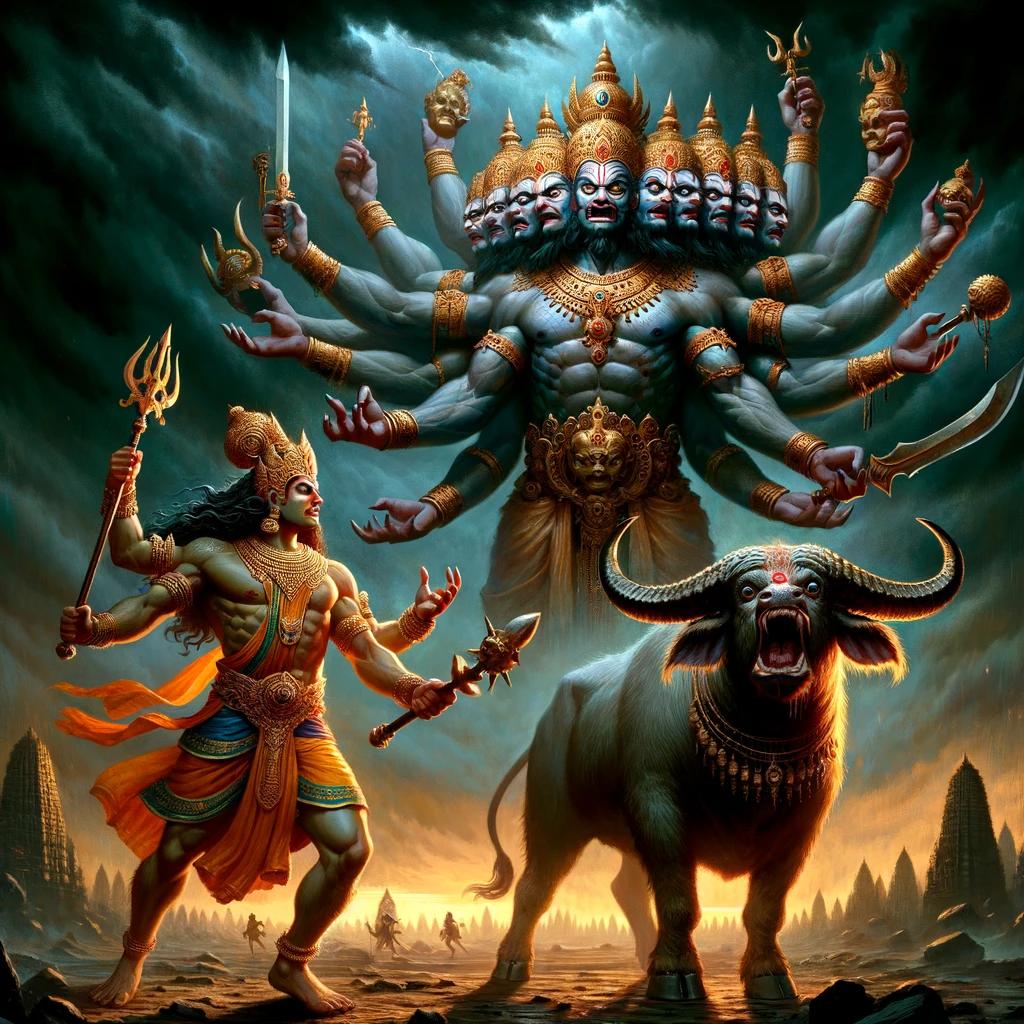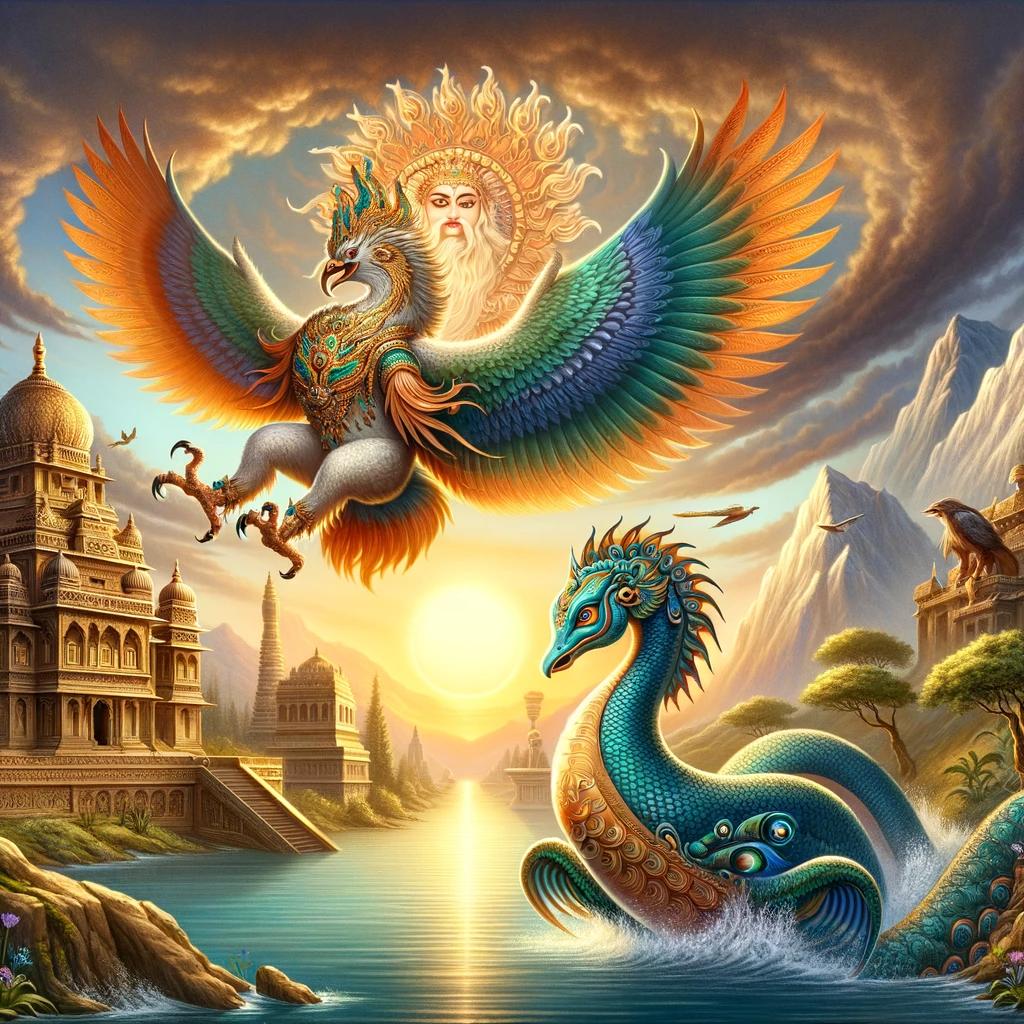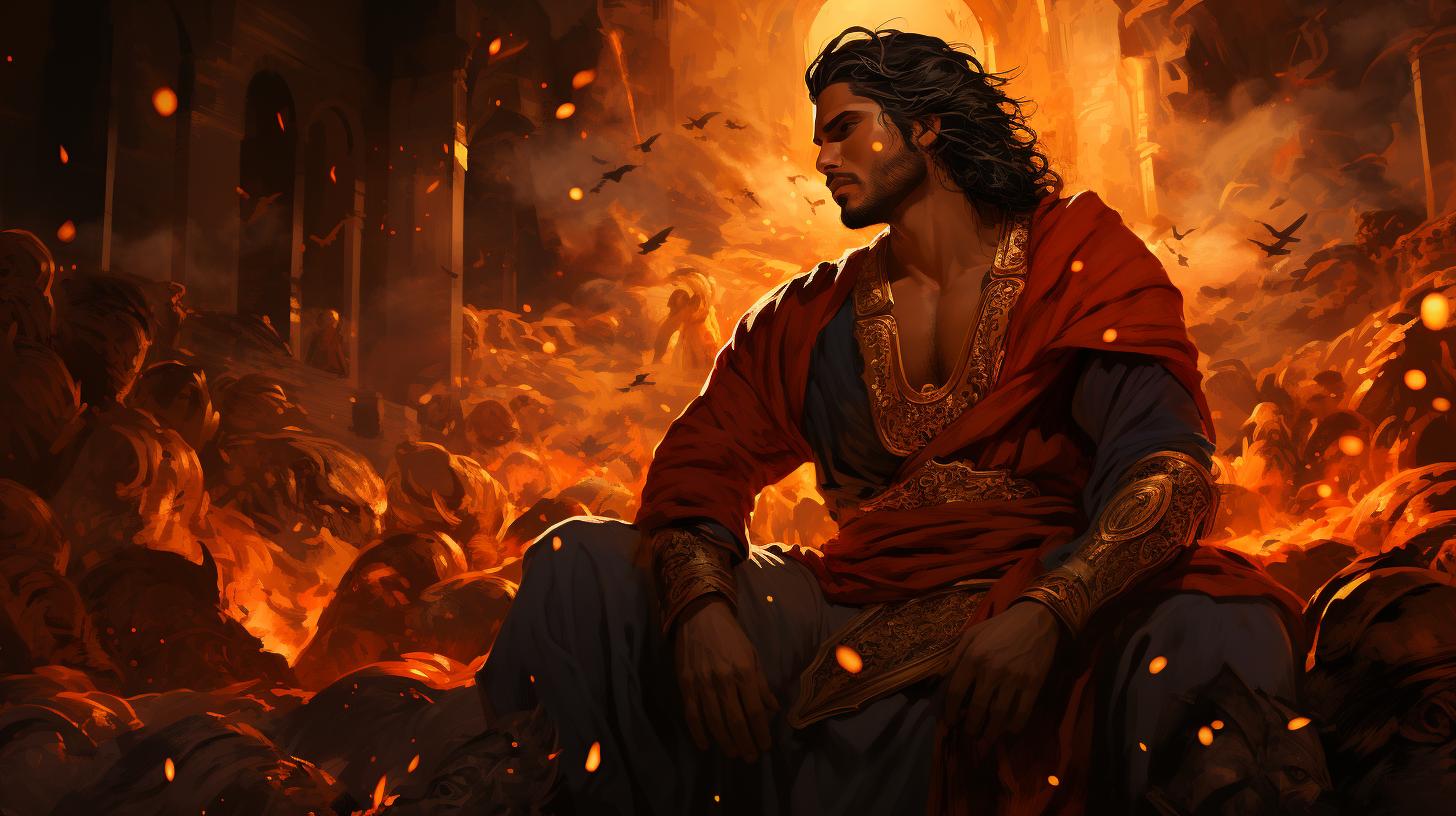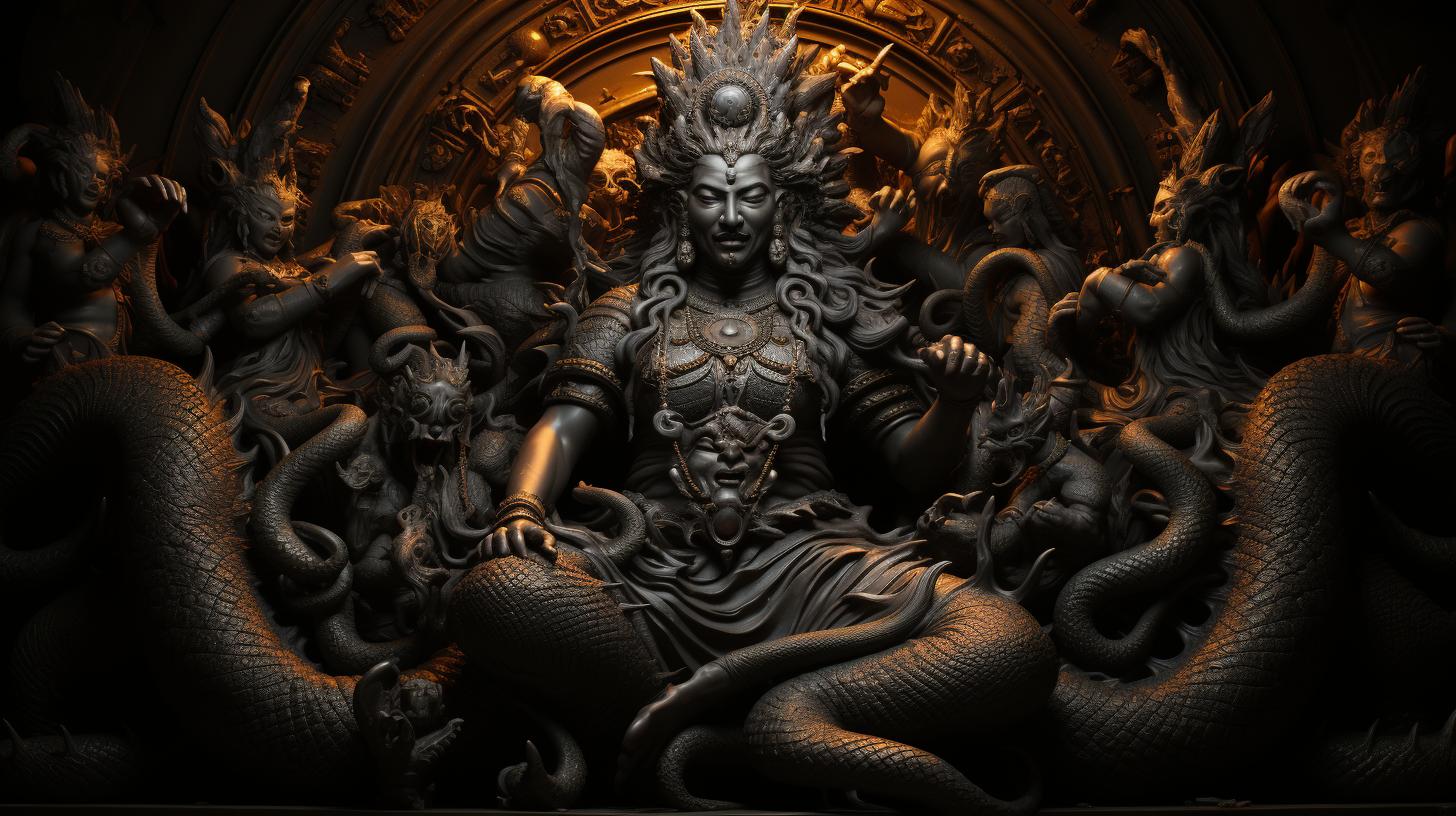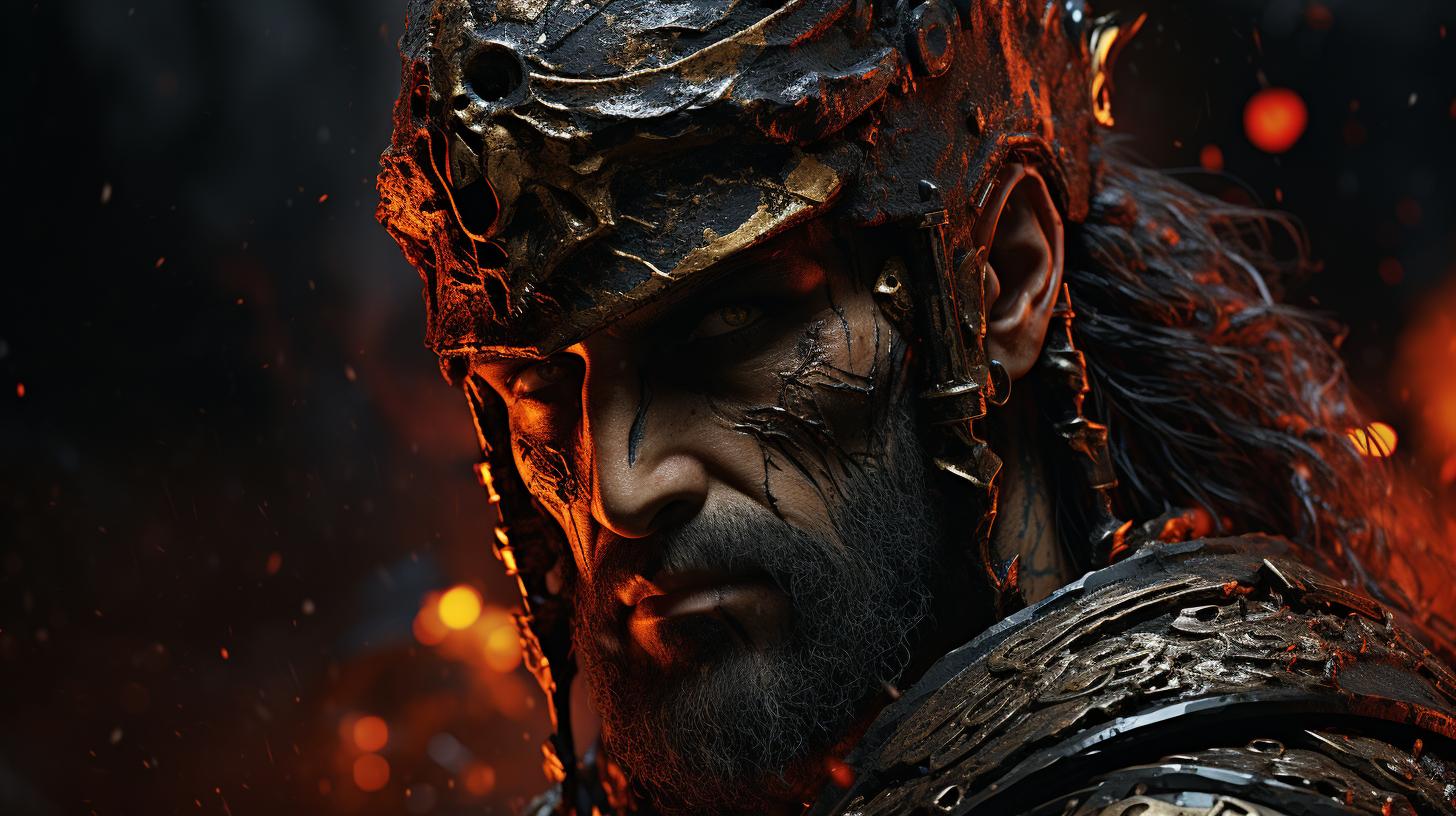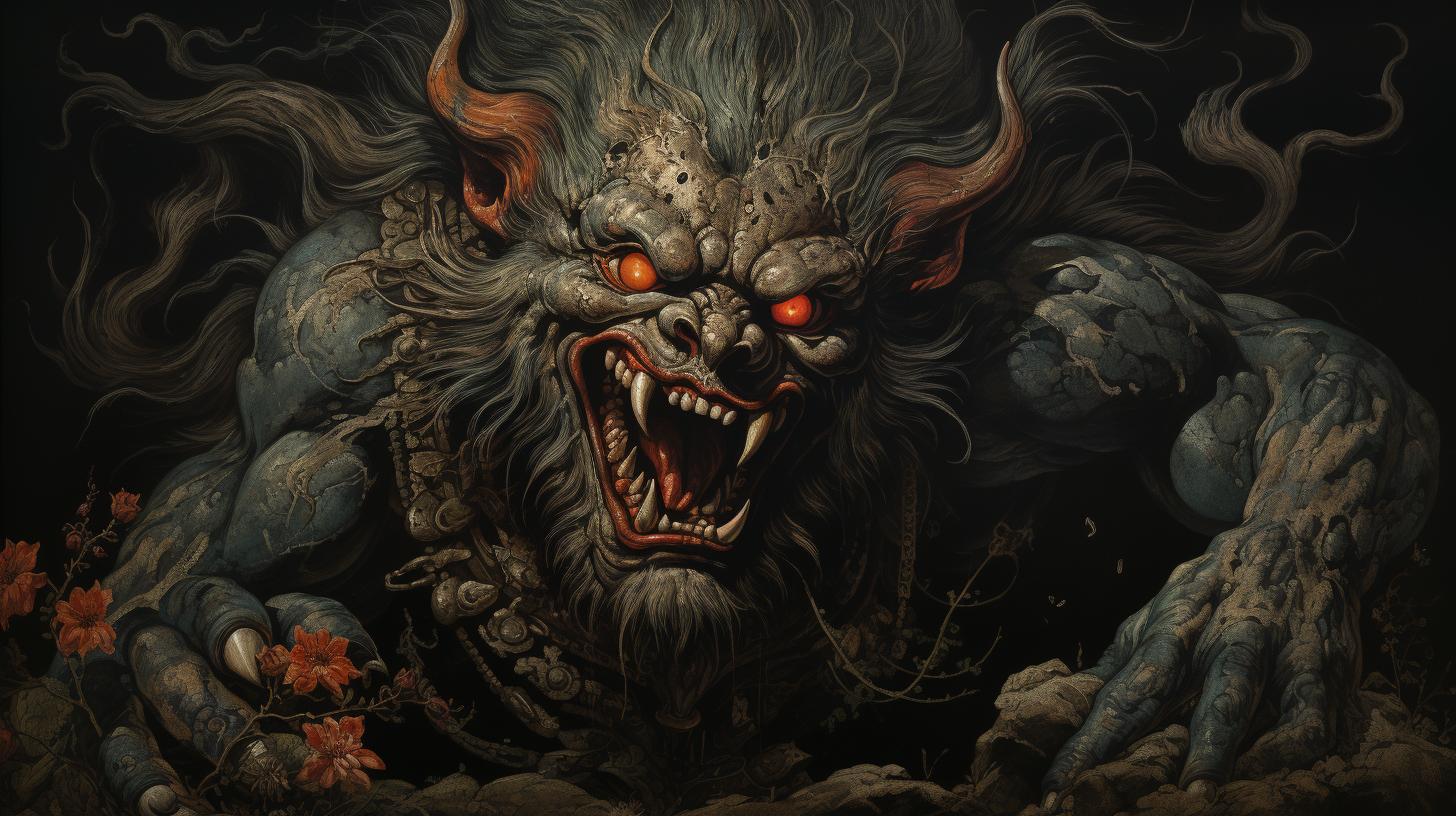King Dhritarashtra: The Blind Warrior King of Hastinapura
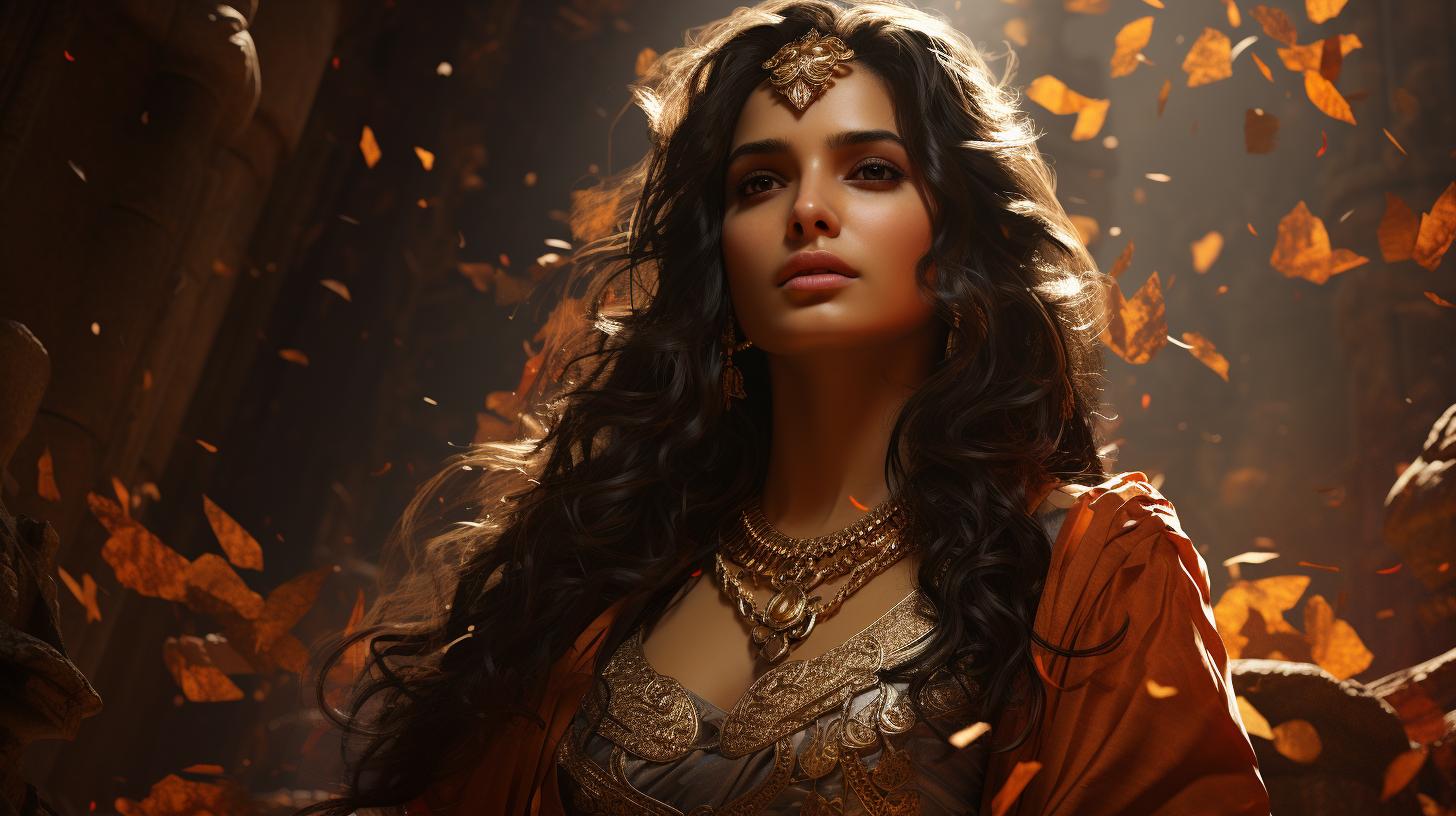
King Dhritarashtra, the blind warrior king of Hastinapura, played a significant role in the ancient Indian epic, the Mahabharata. Born with incredible physical strength despite his blindness, Dhritarashtra was trained in military arts by Bhishma and Kripacharya.
Though unable to handle weapons, he possessed the power to crush iron with his bare hands. Marrying Gandhari, they had a hundred sons known as the Kauravas, and a daughter named Dushala.
Dhritarashtra’s story is intertwined with a succession crisis and the consequential Kurukshetra War, making him a central figure in this epic tale.
The Story of King Dhritarashtra
Birth and Early Life
King Dhritarashtra, the central character of the epic Mahabharata, was born as the biological son of Veda Vyasa and Ambika. However, he was adopted by King Vichitravirya of Hastinapura. Despite being blind from birth, Dhritarashtra exhibited remarkable strength, earning him the name ‘the supporter of the nation.’
Strength and Training
During his youth, Dhritarashtra received training in military arts from Bhishma and Kripacharya, even though he couldn’t wield weapons due to his blindness. Nonetheless, his physical prowess was so astounding that it was said he could crush iron with his bare hands.
The Coronation Dilemma
When the time came to name an heir, Vidura suggested that Dhritarashtra’s younger brother, Pandu, would be a better choice due to his blindness. Although bitter about losing his rightful legacy, Dhritarashtra reluctantly agreed to pass the crown to Pandu.
Subsequently, Dhritarashtra married Gandhari, and they had a hundred sons known as the Kauravas, along with a daughter named Dushala. Additionally, he fathered a son named Yuyutsu with a maid.
Dhritarashtra’s Family and Children
Dhritarashtra’s family played a crucial role in shaping the events of the Mahabharata.
Let’s explore his marriage to Gandhari, the birth of the Kauravas, and his son Yuyutsu.
Marriage to Gandhari
After Pandu’s coronation, Dhritarashtra married Gandhari, a princess from Gandhara. The union was arranged by Bhishma, the Kuru dynasty’s venerable patriarch. Gandhari, known for her unwavering devotion, chose to blindfold herself like Dhritarashtra, out of empathy for her husband’s condition.
The Birth of the Kauravas
Gandhari gave birth to a hundred sons, collectively known as the Kauravas. Duryodhana, the eldest, became the chief antagonist in the epic. The birth of the Kauravas marked the beginning of a lineage that would be entangled in a fierce struggle for power with their cousins, the Pandavas.
Yuyutsu: Dhritarashtra’s Son with a Criada
In addition to the Kauravas, Dhritarashtra had a son named Yuyutsu. Yuyutsu’s mother was a criada, a servant in the palace. Although Yuyutsu was not born to a royal mother, he gained recognition and respect due to his noble qualities and skills as a warrior.
Succession Crisis and The Kurukshetra War
Following the death of King Pandu, a succession crisis emerged in the Kuru kingdom. Dhritarashtra, as the elder brother, expected to ascend to the throne. However, Vidura suggested that Pandu’s son, Yudhishthira, would be a more suitable choice due to Dhritarashtra’s blindness.
Despite his bitterness, Dhritarashtra reluctantly agreed to pass on the crown to Yudhishthira, fearing his own inability to rule effectively.
However, Dhritarashtra’s eldest son, Duryodhana, fueled by his ambitions, became a major challenger to the Pandavas’ claim to the kingdom. Over time, tensions escalated, leading to the Kurukshetra War, one of the most significant conflicts in ancient Indian history.
Dhritarashtra played a crucial role during this war as the leader of the Kaurava faction, opposing the Pandavas and their allies.
Despite his affection for his sons, Dhritarashtra’s decision-making was often clouded by his emotional attachment and a desire to protect his lineage. This bias led to several poor judgments, which ultimately contributed to the downfall of the Kauravas.
Despite Krishna’s attempts to guide him towards righteousness, Dhritarashtra remained entangled in his son Duryodhana’s destructive ambitions.
The Kurukshetra War resulted in immense bloodshed and loss, with Dhritarashtra witnessing the devastation caused by his own kin. Although he did not actively participate in the combat due to his blindness, he carried the heavy burden of responsibility for the war’s consequences on his shoulders.
His role serves as a cautionary tale about the dangers of unchecked ambition and the consequences of power struggles.
Dhritarashtra’s Role in the Mahabharata
Dhritarashtra’s role in the Mahabharata epic was marked by his complex dynamics with his eldest son, Duryodhana. As the blind king, Dhritarashtra harbored immense love for Duryodhana, often giving in to his manipulative schemes and biased judgments.
Their relationship showcased the struggles of a father torn between his responsibilities as a king and his affection for his ambitious son.
Dynamics with Duryodhana
- Dhritarashtra’s unwavering support for Duryodhana fueled the growing tensions between the Kauravas and the Pandavas.
- Despite being aware of Duryodhana’s flaws and unjust actions, Dhritarashtra failed to rectify the situation, leading to the eventual Kurukshetra War.
- The father-son dynamics became a symbol of blind love, ego, and the corrosion of ethical values.
Relationship with Pandavas
- Dhritarashtra’s relationship with his nephews, the Pandavas, was marked by envy and resentment.
- He constantly felt overshadowed by their virtues and popularity, igniting a deep sense of insecurity within him.
- However, Dhritarashtra also recognized the Pandavas’ strength and capabilities, which added further complexity to their relationship.
Influence of Vyasa and Krishna
- Vyasa, Dhritarashtra’s biological father, played a significant role in his life and served as a guiding force.
- Through his wise counsel, Vyasa urged Dhritarashtra to see beyond his blindness and understand the consequences of his actions.
- Krishna, as Dhritarashtra’s nephew and a central figure in the Mahabharata, attempted to steer him towards righteousness and a path of peace.
- Dhritarashtra’s interactions with Vyasa and Krishna highlighted the significance of mentorship and divine guidance in his journey.
Dhritarashtra’s Blindness as a Symbol
Dhritarashtra’s blindness serves as a powerful symbol in the Mahabharata.
It represents not only his physical handicap but also his spiritual and moral blindness. Let’s delve into the symbolism of Dhritarashtra’s blindness and explore its impact on decision-making and the lessons we can learn from his character.
Symbolism of Dhritarashtra’s Blindness
Dhritarashtra’s blindness goes beyond its literal meaning. It symbolizes his inability to see the truth, both within himself and in the world around him. Through his blindness, he becomes a metaphor for ignorance, attachment, and the consequences of unchecked desires.
It highlights the importance of inner vision and introspection in the pursuit of righteousness.
Impact on Decision-Making
Dhritarashtra’s blindness profoundly influences his decision-making throughout the epic. His inability to clearly see the consequences of his actions leads to a series of disastrous choices. His attachment to his sons, the Kauravas, clouds his judgment and propels him towards a path of self-destruction.
His blindness becomes a cautionary tale about the dangers of being driven solely by personal desires, neglecting the welfare of the kingdom and ignoring wise counsel.
Lessons Learned from Dhritarashtra’s Character
Dhritarashtra’s character provides significant lessons for all of us. His story teaches us the importance of self-awareness and the dangers of succumbing to our inner demons. It reminds us to cultivate discernment and embrace the wisdom that comes from inner vision.
Dhritarashtra serves as a reminder that true strength lies in acknowledging one’s limitations, seeking guidance when needed, and making choices that prioritize the greater good over personal desires.
Legacy and Historical Significance
The legacy of King Dhritarashtra extends beyond his personal life and the events of the Mahabharata.
His contributions to the Kurukshetra War, his impact on the Kuru Kingdom, and the cultural and spiritual reflections associated with his character have left a lasting mark on history.
Dhritarashtra’s Contribution to the Kurukshetra War
In the Kurukshetra War, Dhritarashtra played a significant role as the leader of the Kaurava army.
Despite his blindness, he provided strategic guidance and inspired his sons, the Kauravas, to fight fiercely against the Pandavas. His determination and fierce loyalty to his family fueled the Kauravas’ relentless pursuit of power.
Impact on the Kuru Kingdom
Dhritarashtra’s reign had a profound impact on the Kuru Kingdom. Under his rule, the kingdom experienced a turbulent period marked by internal conflicts and the breakdown of societal values. Dhritarashtra’s indulgence and favoritism towards the Kauravas contributed to the deterioration of justice and governance, eventually leading to the war.
Cultural and Spiritual Reflections
- The character of Dhritarashtra serves as a symbol of attachment, blindness, and the consequences of unchecked power.
- His blindness is seen as a metaphor for the blindness of ignorance and the inability to discern right from wrong.
- Dhritarashtra’s struggles highlight the importance of self-awareness, introspection, and moral responsibility in leadership.
- His tragic downfall serves as a lesson about the destructive nature of greed, ego, and the consequences of selfish actions.
The cultural and spiritual reflections surrounding Dhritarashtra continue to inspire contemplation and serve as a reminder of the timeless wisdom embedded in ancient Indian epics.
.

